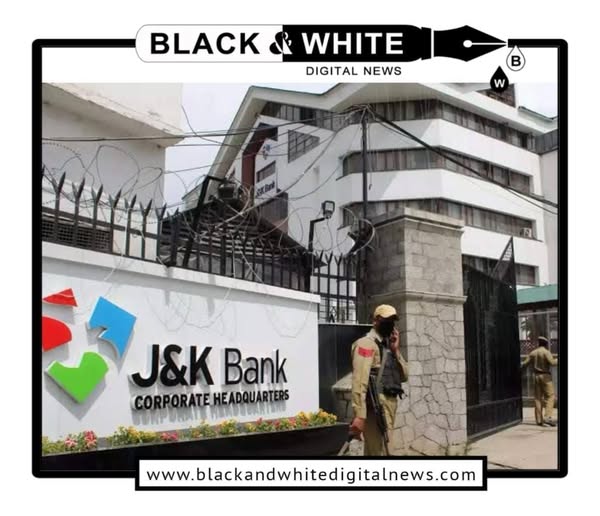Jammu & Kashmir Bank Launches “Karz Se Mukti” Amid Leadership Vacuum and Concerns Over Governance
||Black and White Digital News ||
||Parvinder Singh December 20,2024 ||
Jammu & Kashmir Bank has announced a Special One-Time Settlement (OTS) Scheme titled “Karz Se Mukti” to address its rising Non-Performing Asset (NPA) levels. While this initiative reflects the bank’s efforts to strengthen its financial position, it comes against a backdrop of governance concerns and regulatory challenges, with the bank currently operating without a Chairman and facing uncertainty over the appointment of a new Managing Director (MD).
The “Karz Se Mukti” scheme, effective January 1, 2025, aims to enable eligible borrowers to settle their outstanding loans classified under NPA categories (Doubtful I, II, III, and Loss/RLA) as of September 30, 2024. Borrowers with principal balances of up to ₹5 crore can apply, with the scheme closing on March 31, 2025. By segmenting borrowers into lower, mid, and upper tiers, the bank plans to ensure tailored settlements based on credit exposure and pledged securities.
Governance Concerns and Leadership Crisis:
The announcement of the scheme comes at a time when J&K Bank is grappling with a leadership vacuum. Managing Director Baldev Parkash recently completed his tenure, and the post of Chairman has remained vacant—a situation that violates Reserve Bank of India (RBI) guidelines mandating a clear leadership structure in banks.
To address this, a screening committee led by Chairman who is of rank of additional chief rank J&K has been formed to shortlist candidates for the MD position. However, the delay in appointing leadership has raised serious concerns about the government’s and RBI’s approach to ensuring stability in this prestigious financial institution. Critics argue that the lack of urgency undermines the credibility of both the bank and its regulators, particularly at a time when decisive leadership is critical for navigating financial challenges.
Focus on NPA Reduction Through “Karz Se Mukti” :
Despite the leadership challenges, J&K Bank has set ambitious goals for reducing its NPAs through the new scheme. By incentivizing branch-level and administrative performance, the bank aims to energize its operations:
– Branches achieving NPA reductions of 50% to 90% will be rewarded, with top-performing clusters and zones receiving recognition from the Managing Director and CEO.
– The scheme excludes fraud accounts and mandates proactive outreach by branches to ensure maximum participation.
Broader Questions of Accountability:
The absence of key leadership positions has reignited debates about the governance structure of J&K Bank. As one of the region’s most significant financial institutions, the bank plays a pivotal role in supporting local businesses and economic growth. Yet, the prolonged leadership vacuum reflects a lack of seriousness on the part of the authorities and raises questions about compliance with regulatory standards.
The RBI’s role in ensuring adherence to its norms also comes under scrutiny. Observers argue that the central bank must take a firmer stance to address these gaps, given J&K Bank’s systemic importance. The government, too, faces criticism for its perceived inertia in addressing the leadership crisis, which some see as symptomatic of a broader neglect of institutional integrity in the region.
Balancing Recovery and Reform:
While the “Karz Se Mukti” scheme highlights the bank’s commitment to addressing financial challenges, its success hinges on both internal efficiency and broader structural reforms. Resolving the leadership crisis and ensuring compliance with RBI norms are essential to restoring confidence among stakeholders.
As J&K Bank rolls out its NPA settlement initiative, the institution finds itself at a crossroads. Balancing immediate recovery efforts with the need for governance reforms will determine its ability to navigate current challenges and secure a sustainable future. For now, the questions surrounding its leadership and regulatory adherence remain pressing, casting a shadow over its otherwise promising initiatives.




